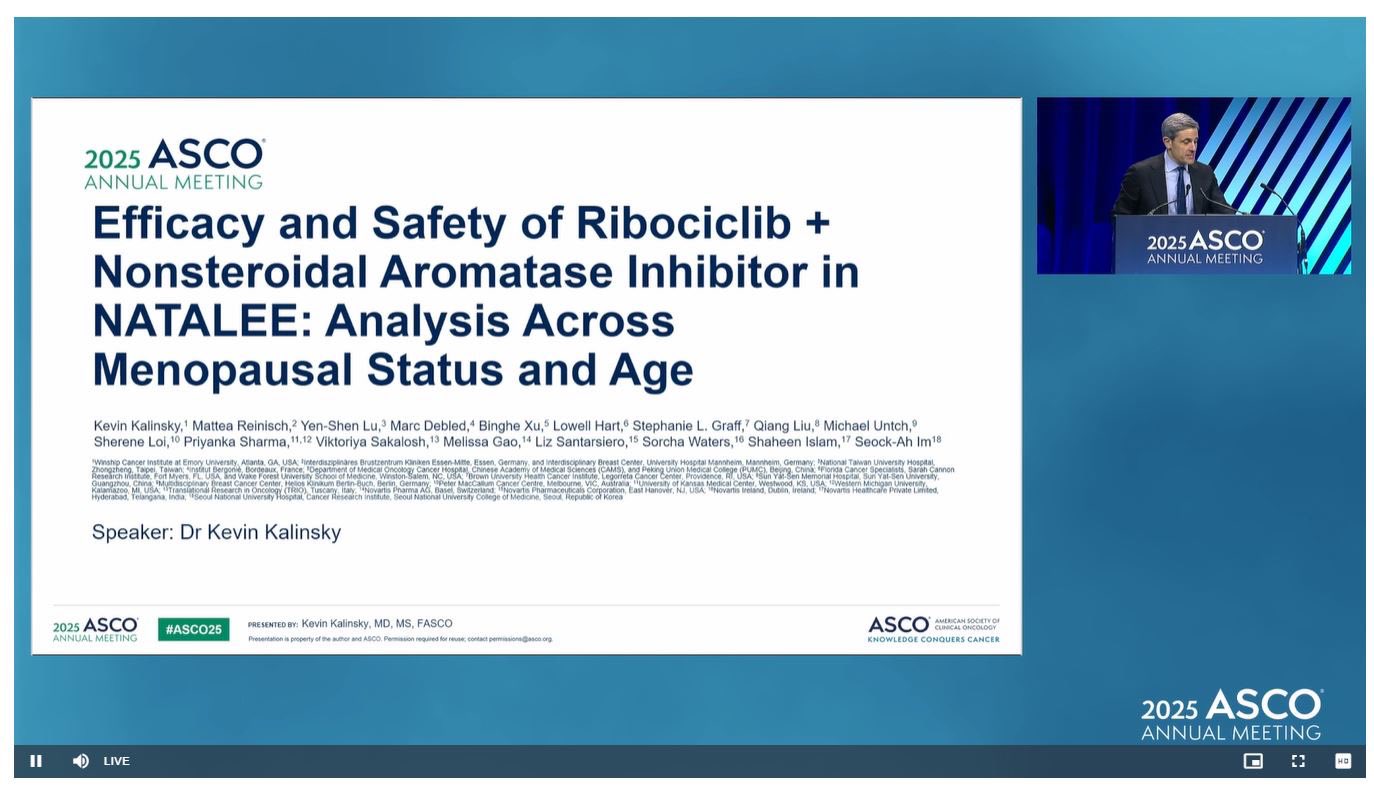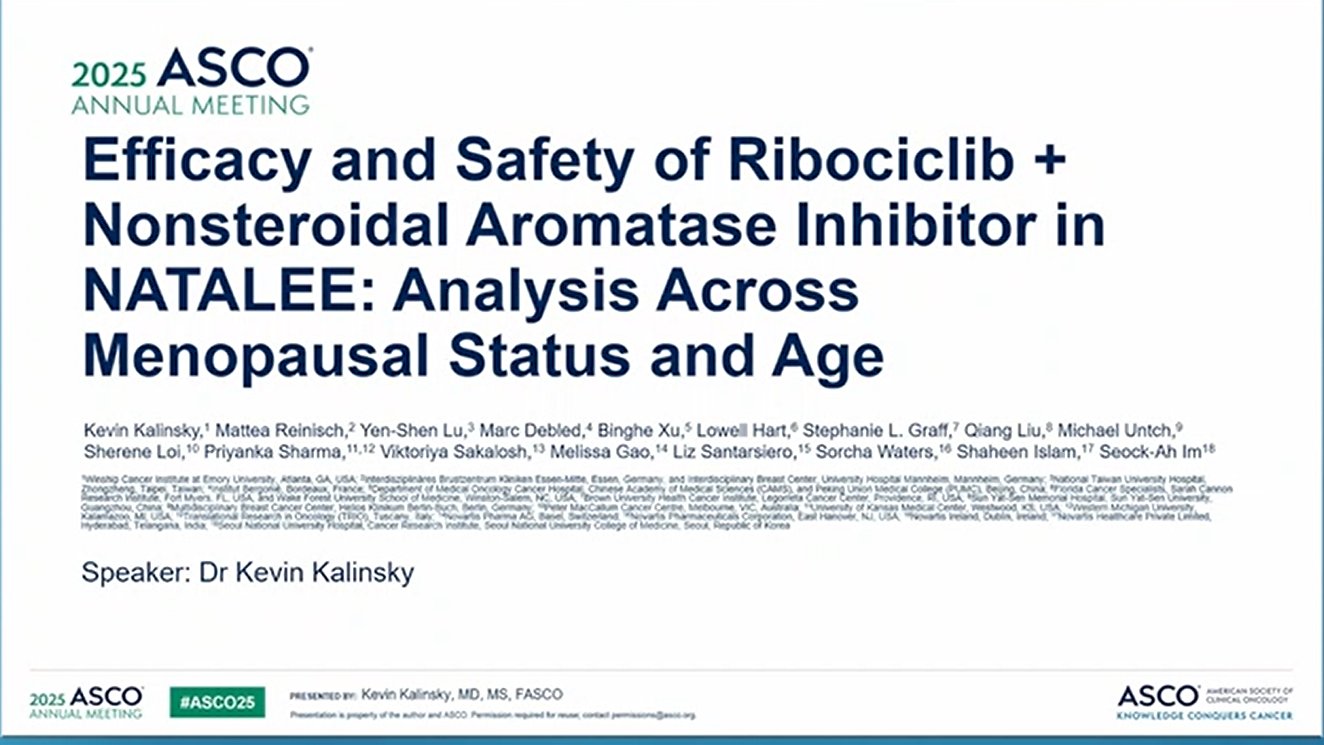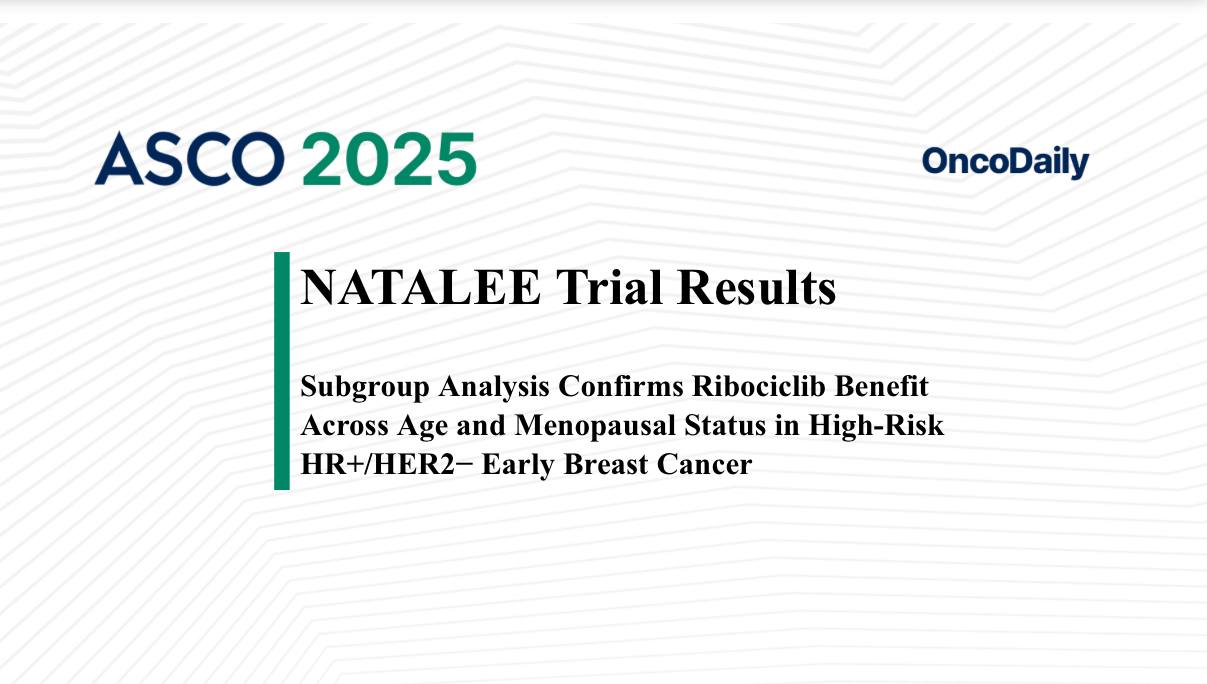At ASCO Breast Cancer Congress 2025, Dr. Kevin Kalinsky and an international team of investigators presented detailed subgroup data from the Phase III NATALEE trial, exploring the efficacy and safety of ribociclib (RIB) plus a non-steroidal aromatase inhibitor (NSAI) compared to NSAI alone in patients with stage II/III hormone receptor–positive (HR+), HER2-negative early breast cancer (EBC) at high risk of recurrence. This analysis focused on outcomes by menopausal status and age, providing insights into the consistency of benefit across diverse patient populations.

What Is the NATALEE Trial?
The NATALEE trial is a large, global, randomized study evaluating the addition of ribociclib to standard endocrine therapy (NSAI ± goserelin in premenopausal women) in HR+/HER2− early breast cancer. The primary endpoint was invasive disease–free survival (iDFS), with secondary endpoints including distant disease–free survival (DDFS), recurrence-free survival (RFS), and safety.
In this subgroup analysis:
-
Patients were stratified by menopausal status (premenopausal [PreM] vs postmenopausal [PostM]) and age (<40 vs ≥40 for PreM; <60 vs ≥60 for PostM).
-
Men were excluded, and all PreM women received goserelin.
-
Data were analyzed at a median follow-up of 44.2 months (cutoff: April 29, 2024).
Key Findings
Baseline Characteristics
At study entry, premenopausal (PreM) patients exhibited more aggressive disease features compared to their postmenopausal (PostM) counterparts—highlighting the distinct clinical profile of younger women with HR+/HER2− early breast cancer.
-
A higher percentage of PreM patients had an ECOG performance status of 0, indicating better baseline functional status: 86.8% vs 80.1% in PostM.
-
Ki-67, a marker of cellular proliferation, was elevated (>20%) in 39.9% of PreM patients, compared to 34.4% in PostM.
-
Nodal involvement (N1–N3) was more frequent in PreM (63.4%) than PostM (56.9%).
-
Larger tumors (T3/T4) were also more common in the younger group: 28.7% of PreM vs 24.0% of PostM.
These differences underscore the biologic aggressiveness and higher-risk profile of early breast cancer in younger, premenopausal women.
Efficacy Outcomes
The efficacy results of ribociclib in combination with a nonsteroidal aromatase inhibitor (NSAI) demonstrated consistent clinical benefit across both premenopausal (PreM) and postmenopausal (PostM) women, despite baseline differences between the groups.
In terms of invasive disease–free survival (iDFS), the hazard ratio (HR) for PreM patients was 0.671 (95% CI: 0.518–0.870), while for PostM patients it was 0.746 (95% CI: 0.607–0.917), indicating a meaningful reduction in the risk of invasive disease recurrence for both groups.
Distant disease–free survival (DDFS) also showed favorable outcomes, with an HR of 0.655 (95% CI: 0.498–0.861) in PreM patients and 0.759 (95% CI: 0.612–0.941) in PostM patients. Similarly, for recurrence-free survival (RFS), ribociclib plus NSAI achieved HRs of 0.641 (95% CI: 0.486–0.845) in PreM and 0.735 (95% CI: 0.588–0.919) in PostM patients.
Crucially, the benefits of treatment were consistent regardless of patient age. Among premenopausal women, outcomes were similar between those under 40 and those aged 40 or older. Likewise, among postmenopausal women, efficacy outcomes did not significantly differ between those younger than 60 and those aged 60 and above.
These findings underscore the broad utility of ribociclib in combination with NSAI as an effective treatment option for patients with high-risk stage II/III hormone receptor–positive, HER2-negative early breast cancer, irrespective of menopausal status or age.
What People Are Saying About the NATALEE Trial?
Susan G. Komen, global leader in breast cancer research, advocacy, and community health programs, shared on X.
“Update from the NATALEE trial presented by Kevin Kalinsky showed that ribociclib plus aromatase inhibitors is effective in preventing ER-positive breast cancer recurrence regardless of menopausal status and age.”

Safety and Tolerability
Ribociclib demonstrated a favorable safety profile, with side effects that were generally manageable across age groups and menopausal status. Notably, premenopausal (PreM) patients were less likely to discontinue treatment due to adverse events (AEs) compared to postmenopausal (PostM) patients. Specifically, 16.1% of PreM patients discontinued ribociclib due to AEs, compared with 22.9% of PostM patients.
Dose reductions due to AEs were similarly frequent in both groups—22.4% in PreM and 23.6% in PostM—suggesting consistent tolerability overall. However, among those who discontinued therapy, a larger proportion of PreM patients had done so without a prior dose reduction (75.4% vs 67.5%). This finding raises the possibility that earlier dose adjustments may improve long-term treatment continuation, particularly in younger patients.
When analyzed by age, younger patients showed lower discontinuation rates:
-
Only 10.5% of patients under 40 years stopped treatment
-
In contrast, 17.5% of PreM patients aged ≥40 years discontinued
-
Among PostM patients, discontinuation rates were 17.8% for those under 60 and 27.9% for those aged 60 and above
The most common adverse event leading to discontinuation in both groups was an elevation in alanine aminotransferase (ALT) levels, occurring in 6.2% of PreM and 8.0% of PostM patients.
Importantly, despite these side effects, the addition of ribociclib did not negatively affect patients’ quality of life (QoL). Assessments using the EORTC QLQ-C30 global health status and physical functioning scales showed no significant difference in time to deterioration between treatment arms across all subgroups. This indicates that ribociclib maintained patients’ overall well-being, even when added to standard endocrine therapy.
What This Means for Patients
The NATALEE subgroup analysis affirms that ribociclib plus NSAI offers meaningful benefit across a broad spectrum of women with high-risk HR+/HER2− early breast cancer, regardless of menopausal status or age. Younger, premenopausal women—who often face more biologically aggressive disease—derived substantial benefit from the combination, with lower treatment discontinuation rates and preserved quality of life.
These data reinforce the role of CDK4/6 inhibition in early-stage HR+/HER2− breast cancer and support its use across diverse clinical profiles.


